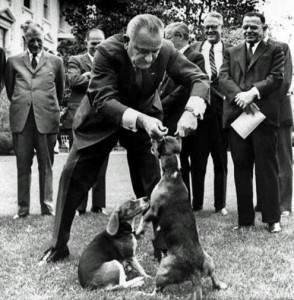Master of Persuasion
I just finished reading The Passage of Power, the fourth volume of Robert Caro’s biography of Lyndon B. Johnson. I have to confess I’ve never been a huge fan of LBJ’s—probably because I spent a lot of time in the principal’s office in elementary school and his portrait gazed down at me as I waited to be called in to see the principal.
As a biography, it’s a good read. However, as a master’s level tutorial on persuasion, power, and influence, it is a masterpiece.
LBJ rose from very poor and humble roots to the highest office in the land through the application of practical—some would say ruthless—persuasion in all its forms, from face to face selling to nationwide speeches.
Phenomenal salesman
Many of his contemporaries said he was the greatest one-on-one salesman they had ever seen. He could talk to strong-minded people who were determined not to do what LBJ wanted, and emerge getting his own way. One of the fundamental skills he had to enable this capability was that of reading other people. Caro calls him “a reader of men”. He learned how to pay close attention to others. Johnson said, “No matter what a man is saying to you, it’s not as important as what you can read in his eyes.”
He seemed to sense each man’s individual price, and then would use that to turn him. For example, after Kennedy’s death, LBJ wanted Earl Warren to chair the commission to investigate the assassination, but Warren refused it. When he found out, LBJ called him to the Oval Office. He used the identity appeal: knowing Warren had served in the Army in WWI, he said he was sure he would give anything to his country if could save one more life. He then stressed how the wild rumors raging around the country about Soviet or Cuban involvement could potentially cause the Soviets to make a move on the US. He closed by saying, “Now I’m surprised that you, the Chief justice of the United States, would turn me down.” According to the White House log, that sale took 22 minutes.
Whether or not it was realistic that the Soviets might attack, Johnson had the ability to sell himself first, and then to transfer that belief to others. Another useful ability in one-on-one encounters was his complete self-discipline as to his message. He was always in control over what he wanted to say. As one colleague said, “You didn’t get any more than Lyndon Johnson wanted to tell you.
Excellent speaker when he had to be
When he got out of the comfort zone of single and small group encounters, LBJ’s success was a little more mixed. He could be an excellent extemporaneous speaker on the election trail, but when he spoke from a prepared text he was stiff and awkward.
Fortunately for him, he knew his limitations and had the self-discipline to surpass them when the occasion really called for it. In his first address to a joint session of Congress the week after he took office, he knew the stakes were immense. He had to reassure the nation that he was no “fluke of history”, but was the right man for the job, that the country was in good hands. Knowing he had a tendency to rush through his speeches, he marked up the text with “Pause Pause” at all the appropriate points. The speech was a triumph that astounded even his friends, interrupted by applause 31 times during its 27 minutes and punctuated by a standing ovation and unanimous praise in the press.
Virtuoso of power
Without question the most important persuasive asset Johnson had was his almost complete mastery of power, to know where it was, to get it, and to use it. Strategically, he knew how to analyze the power relationships in politics. He was a “skilled calculator of power” who could read the signs: who entered the room beside the President, whose ideas the top person in the room listened to, etc. He also knew how to create power for himself within the position he held. In college he maneuvered himself into a position where he, as a student, had the ability to approve who got which part-time jobs. In the Senate, he knew the rules and relationships better than anyone else, and applied the right levers of power to the right people at the right time.
Despite his virtuoso application of power, however, his mastery was not complete. First, his use of his personal and positional power was the least flattering of his traits, because he could grovel in front of those who held more power, and often treated his subordinates harshly. Second, he could overestimate his own abilities. He used to say, “power is where power goes”, meaning his personal skill would give him the ability to wield power from anywhere. That’s one reason he gave up his position in the Senate to accept the vice-presidency. It didn’t work for him there, because one of his rare failures in reading other men was that he underestimated John and Robert Kennedy, finding out to his own mortification that they were equally as adept at wielding power as he was.
What was it good for?
When you read how ruthless and manipulative LBJ could be in the application of persuasion, power, and influence, it’s easy to dismiss his accomplishments. In fact, anyone who has talents of this magnitude and applies them only to serve themselves, deserves our mistrust and scorn.
Yet, one huge saving grace was that in the end he had a solid foundation of idealism and sense of right, and that allowed him to deploy his talents for a cause greater than himself. When he said—just four days after assuming power—that he intended to press for civil rights legislation that year, his advisors counseled him not to waste his power on a lost cause. Johnson’s reply: “Well, what the hell’s the presidency for?”
Over the next six months, he used every skill and pulled every lever of power to accomplish for justice in America what no president since Lincoln had ever been able to do. That is what persuasive power is good for.





